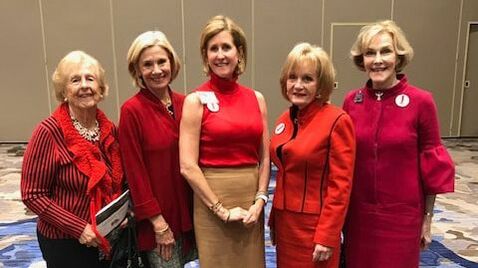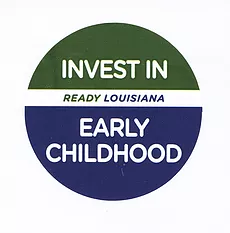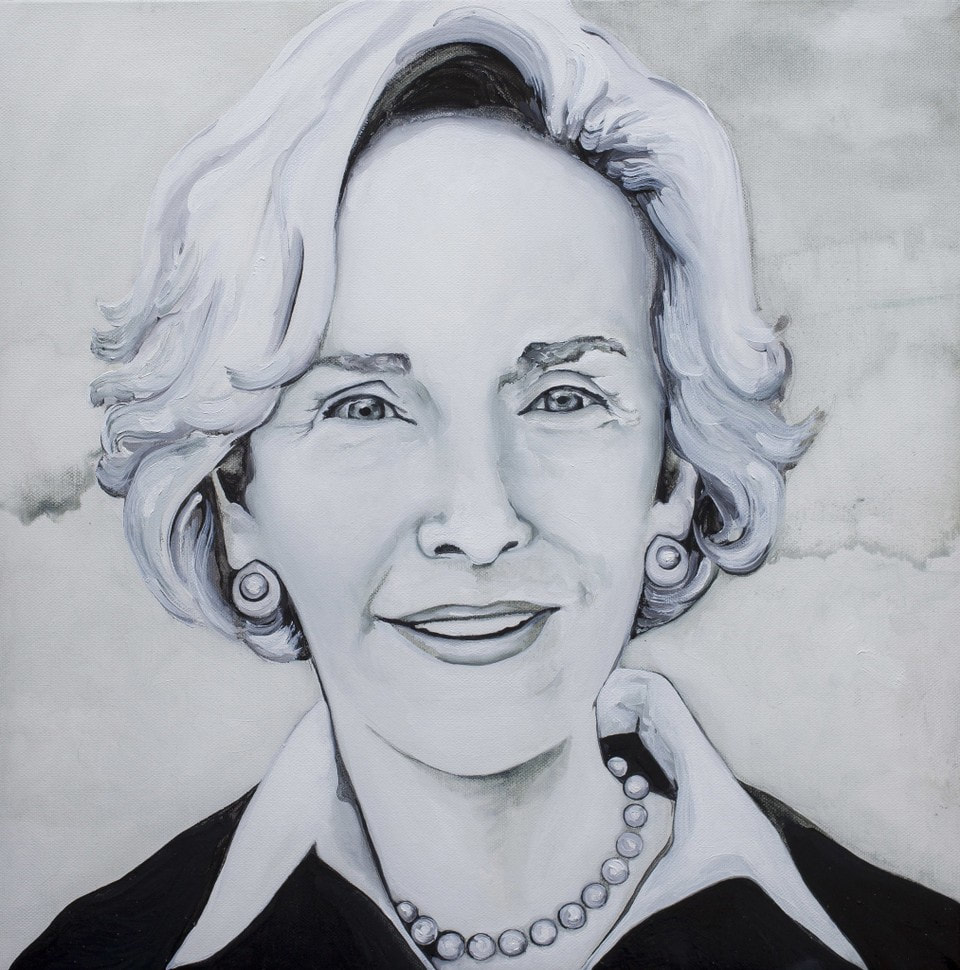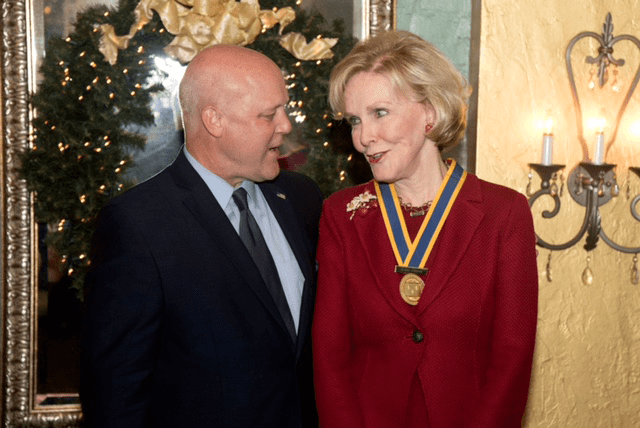|
Organizations statewide have joined together to support increased investment in high-quality early care and education in Louisiana.
High-quality early care and education has a proven impact on promoting employment, reducing poverty and setting children on a path to life-long success, yet Louisiana spends less than 1/2 of 1% of its general funds on early learning. In fact, Louisiana has cut funding for early care and education for children under age 4 by almost 70% over the last 8 years.
Three Executive Committee members of Citizens for 1 Greater New Orleans attended the gala celebration at the University of Louisiana at Lafayette celebrating the opening of the Kathleen Babineaux Blanco Public Policy Center this fall. Stephanie Haynes, Seton Jenkins (honoree), Governor Kathleen Babineaux Blanco and Ruthie Frierson.
A portrait of Ruthie Frierson by artist Saegan Swanson of Where Y'Art, as commissioned by NOLA.com | The Times-Picayune for its "300 for 300" celebration of New Orleans' tricentennial. (NOLA.com | The Times-Picayune) By Contributing writer NOLA.com | The Times-Picayune
The Times-Picayune is marking the tricentennial of New Orleans with its ongoing 300 for 300 project, running through 2018 and highlighting 300 people who have made New Orleans New Orleans, featuring original artwork commissioned by NOLA.com | The Times-Picayune with Where Y'Art gallery. Today: Ruthie Frierson. The icon: Ruthie Frierson. The legacy: Ruthie Frierson was always an enthusiastic New Orleanian, as a successful real estate agent and as a volunteer engaged in myriad causes to improve the city she loves. But Hurricane Katrina's devastation presented a challenge of a different magnitude. After seeing that a move to reform Louisiana's fractured network of levee boards was languishing in Baton Rouge, Frierson set up a group to make change happen. In addition to holding legislators' feet to the fire on that issue -- and pushing for one Orleans Parish assessor's office while they were at it -- Frierson's Citizens for 1 Greater New Orleans embodied what would become a post-Katrina wave of activism, fighting the good fight and inspiring others to follow suit. The artist: Saegan Swanson. The quote: "I went from mourning to rage to hope through action. It brought a renewed sense of hope at a time of total despair." -- Ruthie Frierson, on her emotional journey after Hurricane Katrina TRI-via
Source: The Times-Picayune archives The last big piece of the multibillion-dollar system built after Hurricane Katrina to protect the New Orleans area from flooding during a hurricane or other severe storm is in place, officials said Thursday, marking the end of construction on a set of enormous pumps that will empty the city's three main drainage canals into Lake Pontchartrain.
Read the full story > 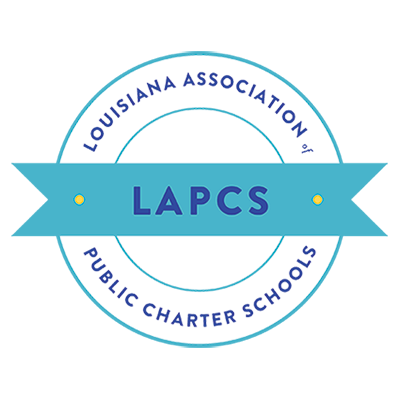 NEW ORLEANS — The Louisiana Association of Public Charter Schools (LAPCS) and seven Type 2 charter schools won a major victory today in the Louisiana State Supreme Court. The Justices upheld the constitutional rights of Type 2 charter schools to receive Minimum Foundation Program (MFP) funding and declared these schools are indeed public schools. “Charter Schools have been in Louisiana for over 25 years and today’s ruling by the Louisiana Supreme Court confirms what we have know all along: charters are public schools,” said LAPCS Executive Director, Caroline Roemer. “This is a major victory for 16,000 students who have been caught in the middle of a political fight over dollars for more than three years and for all those who advocate for more education options for parents.” Read full story > 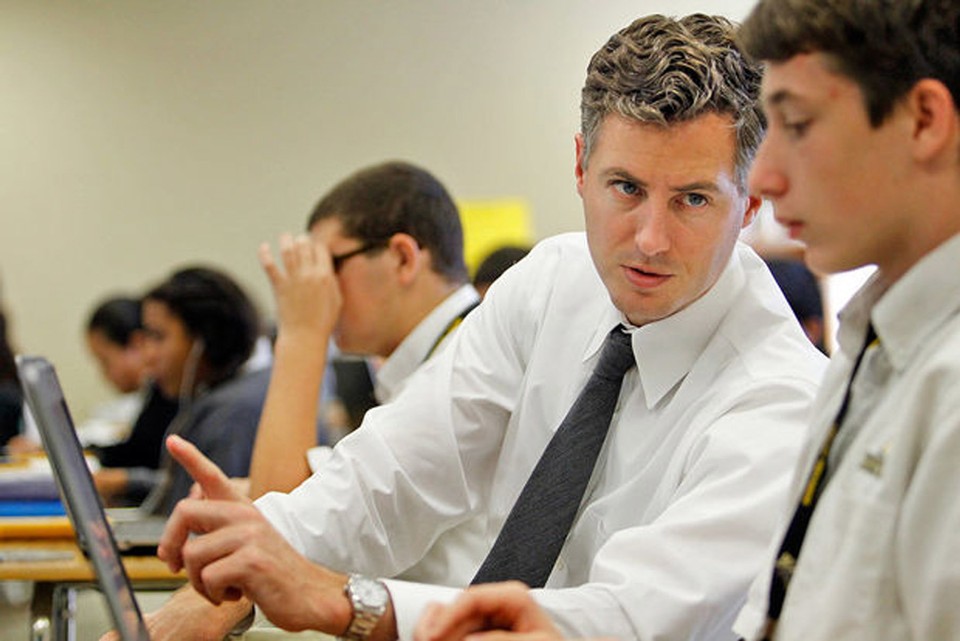 State Superintendent John White, left, has overseen increases in ACT scores, graduation rates and other measures of achievement. (Brett Duke, Nola.com | The Times-Picayune) Opinion by Carol McCall Much is written -- especially nationally -- about what is happening in education in Louisiana. We should be cheering for our students and teachers as we do for our athletes and their coaches. By critically important measures, Louisiana has experienced and continues to experience major wins in education. For more than 20 years, the state has been moving for higher standards and accountability. Now led by state Superintendent John White and his staff at the Department of Education, Louisiana has been nationally recognized for progress in a number of key areas. Teacher preparation: Recognized by the Council of Chief State School Officers, Louisiana has built a collaboration between PreK-12 and higher education institutions for teacher preparation programs that include a year-long teacher internship program, to increase competence prior to entering the classroom. Curriculum-driven reform: According to an article by national education policy journal Education Next, Louisiana's education administration "has quietly engineered a system of curriculum-driven reforms that have prompted Louisiana's public school teachers to change the quality of their instruction in measurable and observable ways." These advances are unmatched in other states. High school graduation rate: In 2005, 54 percent of Louisiana students graduated from high school, and now that number has significantly increased to 77 percent. These results come amidst a five-year push by Louisiana's Department of Education to increase the number of graduates earning employer-validated "Jump Start" credentials and early college credits. Advanced Placement scores: More than 6,500 Louisiana high school students earned college-credit qualifying scores on Advanced Placement (AP) exams in 2017. Since 2012 this number has increased 137 percent. Research shows students who succeed on AP exams are more likely to earn higher GPAs in college, take more classes in their discipline and graduate college on time. ACT scores increase for fourth straight year: As a state, we have made measurable progress increasing the ACT scores of our students. The class of 2017 earned scores that boosted the state's average ACT score for the fourth straight year, now at 19.6. Louisiana is one of only 17 states that require all high school students to participate in this important test. CLEP test college credits increase: According to data from the College Board, Louisiana leads the nation in the College Level Examination Program (CLEP), with a 55 percent increase in the number of high school students earning college credit. CLEP tests students' knowledge from outside the classroom. It is especially useful for home schooled students and those with job experience. NAEP scores show highest growth in the country: In 2015, Louisiana fourth-graders showed the highest growth among all states in the United States on the National Assessment of Educational Progress (NAEP) reading test, and the second-highest growth scores nationally in math. Louisiana's Every Student Succeeds Act (ESSA) plan receives national acclaim: According to an independent review by national advocacy groups, Bellwether Education Partners and the Collaborative for Student Success, Louisiana's plan to comply with the federal ESSA (passed in 2015) presents a strong vision for students and sets high expectations. The Alliance for Excellent Education, published an analysis of the plan, calling it one of the "most promising" in the United States. Progress in any field does not come without focus, collaboration and hard work. Louisiana teachers and students are proving they are up to the task and the challenge. But as a community, are we acknowledging these demonstrable and significant improvements? Are we letting our teachers know we appreciate their hard work? We need to be cheering them on! We need to celebrate Louisiana's education leaders, like John White, who have led the way -- and who work hard every day to keep us moving forward. Carol McCall is chairwoman of the Education Committee for Citizens for 1 Greater New Orleans.  With 350 women in attendance, Leadership Women held its first national conference “Creating a New Vision of Leadership – A National Conversation” in conjunction with the 30th Anniversary Celebration of Leadership Women America on July 27-29th in Dallas, TX. Ruthie Frierson, Founder and Chair Emeritus of Citizens for 1 Greater New Orleans and Melissa Sawyer, Co-founder and Executive Director of Youth Empowerment Project (YEP), were speakers on "Women and Community Activism". Download Transformational Leadership - Skills to Build Collaborative Partnerships » Ruthie Frierson receives a 2016 New Orleans Legends Award from Mayor Mitch Landrieu. As our city approaches its 300th Anniversary, Mayor Landrieu created the New Orleans Legends Awards to recognize those New Orleanians who have helped create not only our history but have indelibly shaped our future.
|

